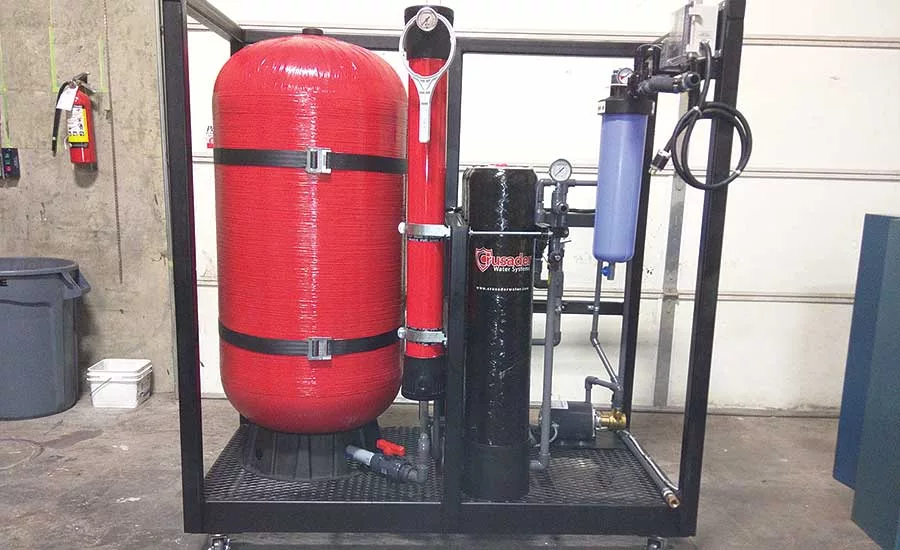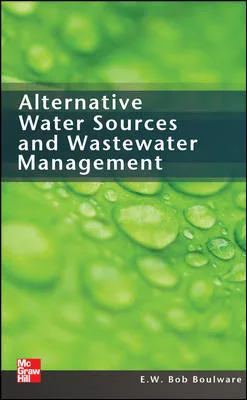Increasing awareness of water quality issues prompts growth in water filtration market
Plumbing contractors need to educate consumers on problems and possible solutions.

Dustin Finkle of Finkle’s Plumbing & Heating installs a Canature WaterGroup 475 Reverse Osmosis system.

Canature WaterGroup's Aqua Flo QCRO is IAPMO R & T Certified against NSF 58 for the reduction of lead and other harmful contaminants.

The ENPRESS PIONEER water filtration system is certified to the NSF/ANSI Standard 53 by IAPMO, for the removal of lead, PFOA/PFOS and Cyst (Giardia and Cryptosporidium).

“Our products are used in many applications for both residential and commercial,” says Dennis Falsken, president, Falsken Water Systems. “From a basic sediment/dirt removal filter for a private well to water softening for a hotel that extends the life of the plumbing, fixtures, water heating equipment and provides aesthetically pleasing water for the guests.

“It’s a whole-house/POE (Point-of-Entry) filtration system, for up to 8 gpm service flow rates,” says Mike Mormino, vice president of sales and marketing, ENPRESS. “It can be installed in a home, restaurant, daycare, school or a multitude of other applications. It is a metered system that counts the gallons the product is certified to remove, and then, through the lights at the top of the system, notifies the consumer when the cartridge needs to be replaced internally.”
Consumers have never been more aware of what is in their water than in these last few years following the Flint, Michigan, water crisis. Rising concerns over lead and other chemicals have increased the popularity and demand for water filtration and purifiers. According to Grand View Research, the global home water filtration unit market size was valued at $8.6 billion in 2018 and is expected to register a CAGR of 15.9% from 2019 to 2025.
“Growing awareness about the ill effects of contaminated surface water, along with declining level of potable water amongst consumers, has resulted in a significant shift in their preferences for technology-based domestic water purification system worldwide,” the report says.
“It will most likely always be the consumer’s decision to improve their drinking water — this might be better tasting drinking water, the removal or reduction of certain elements that concern them or could be nothing at all,” says Dennis Falsken, president, Falsken Water Systems. “Consumers are all different and their expectations for water treatment is a personal or family decision.”
Falsken Water Systems has several treatment options for drinking water depending on the supply water quality and what the end user wants, Falsken explains. The units are certified for the reduction of specific elements, and what the consumer wants eliminated would determine the type of treatment recommended.
“Our products are used in many applications for both residential and commercial,” he says. “From a basic sediment/dirt removal filter for a private well to water softening for a hotel that extends the life of the plumbing, fixtures, water heating equipment and provides aesthetically pleasing water for the guests.
We also provide treatment for many industries, including craft breweries, coffee houses, hotels and resorts, manufacturing, restaurants, craft distillers and more. Each having its own need and requirements for specific water quality to be used for their application. Water treatment needs could be for an array of reasons. Protect and prolong the life of equipment, provide make up water that will enhance and/or maintain finished product characteristics, product integrity, taste better or feel better.”
Mike Mormino, vice president of sales and marketing, ENPRESS, notes the ENPRESS PIONEER water filtration system is certified to the NSF/ANSI Standard 53 by IAPMO, for the removal of lead, PFOA/PFOS and Cyst (Giardia and Cryptosporidium).
“It’s a whole-house/POE (Point-of-Entry) filtration system, for up to 8 gpm service flow rates,” he explains. “It can be installed in a home, restaurant, daycare, school or a multitude of other applications. It is a metered system that counts the gallons the product is certified to remove, and then, through the lights at the top of the system, notifies the consumer when the cartridge needs to be replaced internally.”
Mormino adds that the product has been used in many applications, from rural well water to municipally supplied water sources where lead service lines are present, or where known contaminants are in the water, such as PFOA/PFOS.
“One installation in particular is in a home near Ellsworth Air Force Base in South Dakota, treating the water for a home that has significantly high levels of PFOS in the water, and removing these chemicals down to non-detect,” he says. “We have similar installations in homes in the Greater Milwaukee, Denver Metro, or throughout Michigan, treating and taking care of lead water concerns for consumers.”
A SUSTAINABLE SOLUTION
The Water Quality Association reported 78% of respondents to its 2019 WQA Consumer Opinion Study regularly consume bottled water, averaging 12 bottles daily per household. Health concerns about the chemicals used to make the plastic bottles have encouraged 29% of respondents to consider alternatives such as a refrigerator filtration, under sink filtration or end-of-tap filtration. The study also showed that almost half the households surveyed (45%) already have a refrigerator filter system at home, and 41% have a water filtration system.
Additionally, environmental concerns prompted 24% of the respondents to start using a refillable water bottle instead of individual plastic bottles and encouraged 8% to stop drinking bottled water, the survey said. Another 9% said they stopped using bottled water and bought a home filtration system, according to the report.
John Cardiff, executive vice president of business development, Canature WaterGroup, agrees that the growing concern of aging infrastructure and emerging contaminants is leading homeowners to look for in-home solutions to make their drinking water safe.
“Canature WaterGroup offers a variety of drinking water systems that are suited to a wide range of applications,” he says. “Third-party certifications are the best way for homeowners to ensure their system is producing safe, quality drinking water. The Aqua Flo QCRO is IAPMO R & T certified against NSF 58 for the reduction of lead and other harmful contaminants. All Aqua Flo RO membranes are certified by NSF International to ensure quality drinking water.
“Over the years, we’ve developed a comprehensive line of products to solve a wide variety of residential, private well and commercial applications,” he adds. “We pride ourselves on turning problem water into optimal water for our customers.”
According to Cardiff, the industry is always looking for solutions to emerging problems.
“Most recently, we’ve heard of lead and PFAS/PFOS in North America,” Cardiff says. “Companies are looking at their products to make sure they meet the needs of people trying to rid their water of these contaminants. Third-party certifications are important when it comes to making sure that systems do what they say, particularly in regards to harmful contaminants. As an industry, we’re working hard to make optimal water affordable for homeowners and businesses.
“Continued investment from municipalities and governments is important for improving overall drinking water quality,” he continues. “Right now, municipal reporting and transparency is incredibly important because it gives residents the opportunity to know if they should be adding additional filtration in their home. High quality products with third-party certifications can help homeowners ensure they have safe drinking water in their home.”
THE PLUMBER’S ROLE
The plumbing contractor plays a crucial role in educating consumers about the contaminants in their water and offering possible solutions.
“A plumber is a resource to consumers, offering solutions and an installation resource for water filtration devices into the application,” Mormino says. “The more we can support and educate consumers though the plumbing industry, the more helpful we will be in easing their concerns and water issues.”
Falsken advises plumbing contractors to educate themselves with the basics of water treatment.
“Over the years, we’ve seen some pretty ineffective products installed by plumbers that if they had basic water treatment knowledge, they would know better,” he notes.
“If a contractor is looking to add water treatment to their line of services offered, they should look for a water treatment supplier that is honest, knowledgeable and experienced with a full line of products,” Falsken adds. “Someone they can trust to provide training and answers to them and their clients. This ensures the consumer gets the full benefit of what water treatment has to offer.”
Cardiff agrees that plumbers are often trusted advisors and experts when it comes to water.
“A Plumber is the first person that people look to for advice on how to fix their water problems,” he says. “Many times, they’re the first person to recognize what problems poor water quality is creating in a home: Clogged pipes or shower heads, scale build-up or potentially harmful contaminants that should be removed from drinking water. A plumber’s role is to educate home and business owners on how proper water treatment can solve these problems and recommend high-quality, reliable solutions from reputable companies that stand by their products.”
Canature WaterGroup also offers additional resources to plumbing contractors, Cardiff notes.
“We offer free water testing services and our expert staff make product recommendations based on those water results,” he says. “We also offer training opportunities for plumbers to help them be more confident identifying water quality issues and recommending the right solutions. Our post-installation support also sets us apart. Our customer service team has an average of 20 years water industry experience.”
As a last bit of advice to plumbing contractors, Cardiff says, “Do your homework. Know what’s in your water and then find the right system for the job. Third-party certifications are important; look for products that have their claims verified by North American testing organizations.”
Looking for a reprint of this article?
From high-res PDFs to custom plaques, order your copy today!







